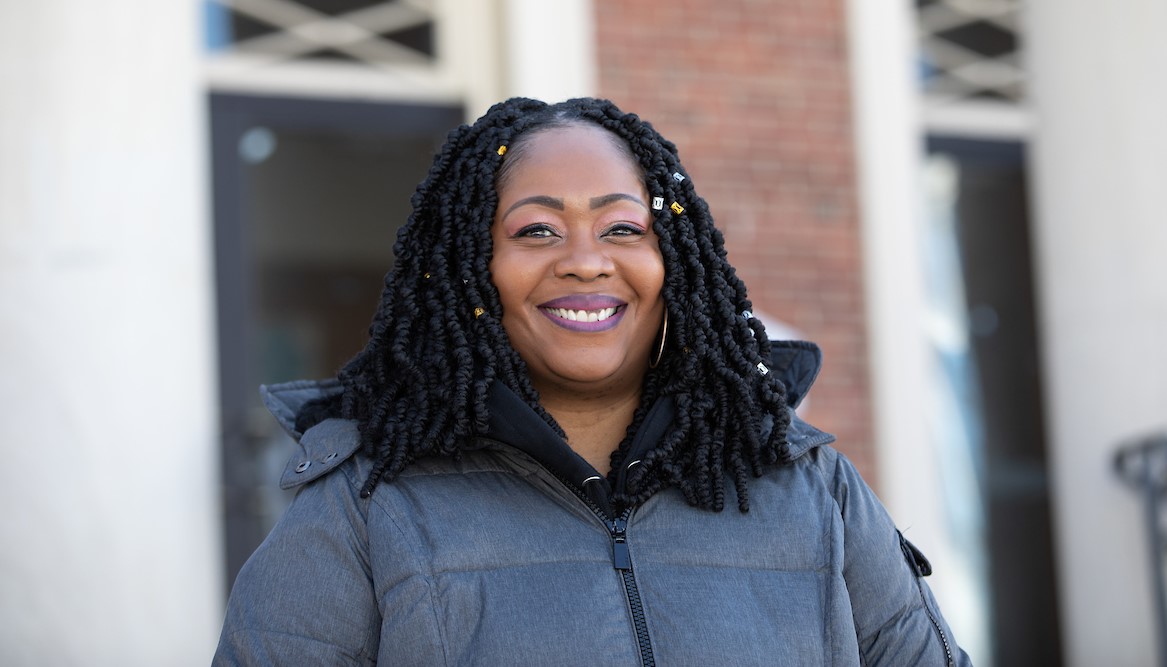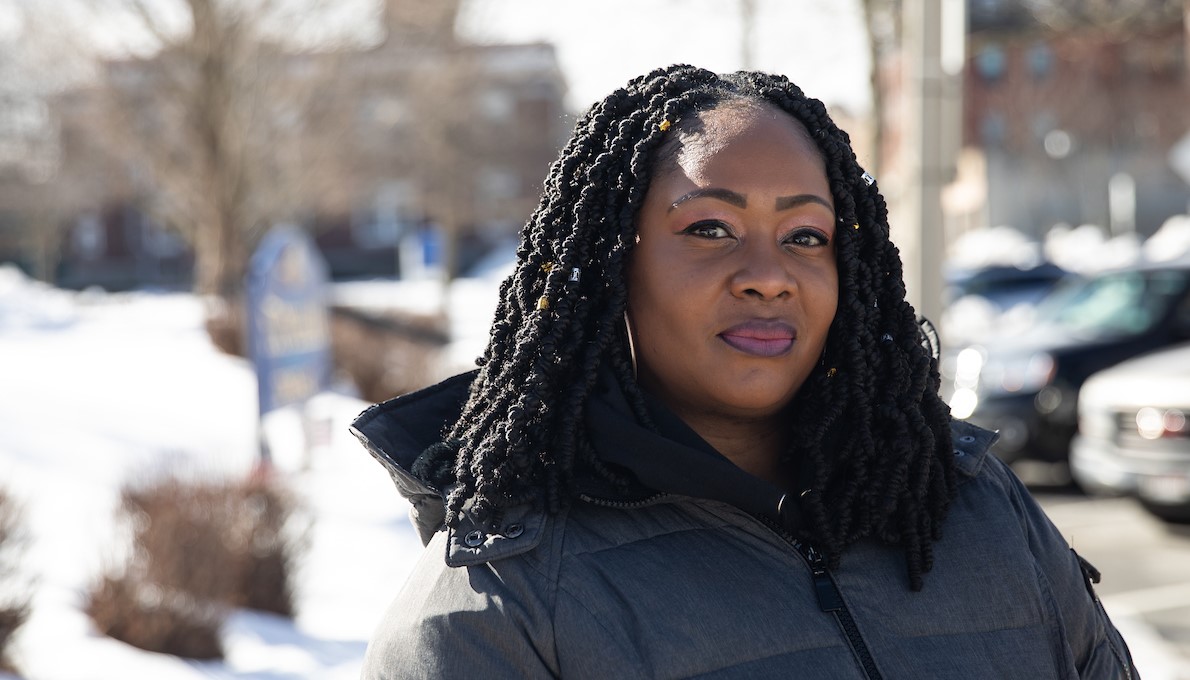
It’s time for an uncomfortable conversation.
Few people would be excited to hear that, especially in the workplace. But staff in the Boston Mayor’s Office of New Urban Mechanics (MONUM) sought help from Suffolk University faculty and students to do exactly that – have serious, sometimes painful, discussions about how to analyze their own biases and become an actively anti-racist organization.
Functioning as a sort of citywide innovation lab, MONUM has piloted dozens of projects to address challenges like affordable housing, street safety, the use of shared spaces, and education access. They’ve deployed solar-powered benches that charge phones while collecting environmental data, created a school bus tracking app for parents, and connected seniors with renters to set up intergenerational housing arrangements. At the heart of what they do is a commitment to making government work better for everyone.
That commitment took on a new urgency following the murder of George Floyd, says Nigel Jacob, co-chair of MONUM. His death “was a call to government that we need to change and not just do things the way that we used to.”
“Our job is to try to experiment with government. So how does government become anti-racist? That’s a big question, so we decided to focus it on us.”
Neighbors and partners
To do that, Chief of Staff Jaclyn Youngblood knew MONUM would need to review past projects and current policies — and pull in outside help to learn more and hold themselves accountable.
“If the future of the public sector is moving toward anti-racism, we want to know how to start that work,” says Youngblood. “Suffolk is right down the street. They are training the next generation of public servants. It made sense to do some of our exploration and inquiry with those students.”
Suffolk professors Erika Gebo and Brenda Bond-Fortier have collaborated for over a decade, working with government agencies and community groups on crime prevention and intervention projects. Their partnership blends perspectives from sociology and public administration, allowing them to combine a depth of analytical research skill with practical application to address pressing problems in society. They’ve also helped shape their own departments’ efforts toward increased diversity and inclusion.
“The mission statement at the core of our department is about looking at how intersections – not just race, but also class, gender, geography, religion, and sexual orientation – affect people's relationships with others, and we can use that knowledge to become a more open and inclusive society” says Gebo, a professor in the sociology and criminal justice department.
Bond-Fortier, a professor in the Sawyer Business School’s Institute of Public Service, says the diversity, equity, and inclusion plan her department created in 2018 as part of their accreditation self-study has engaged students in dialogue, learning, and action around inclusion.
“Students are relieved to hear us talk, out loud, about the real issues and challenges and tensions and conflicts that exist. They desperately want us as a faculty to take a leading role on these kinds of conversations and these projects.”
The collaboration with MONUM was a natural fit.
Bond-Fortier and Gebo recruited graduate students from their Performance Improvement Strategies and Research Methods courses — first by designing projects to address MONUM’s needs, and then conducting research and providing recommendations.
“It’s absolutely critical to explore what it means to be anti-racist, and learn how to evaluate and use measuring tools, which are central to both public administration and crime and justice studies.”
Victoria Oliveira, a crime & justice studies graduate student in Gebo’s Research Methods course, became interested in studying structural racism during her undergraduate work at Suffolk. She explains that true anti-racism goes beyond notions of diversity and inclusion – making it a harder objective to achieve.
“The main difference is the acknowledgement of institutional racism that can’t be fixed by surface-level fixes,” says Oliveira. “There are deep-rooted issues that need to be addressed so people have equal opportunities and resources.”
An insider’s outside view
In conducting the work, Suffolk students had a strong advantage — many in the master of public administration and crime and justice studies programs are already working in government or related fields.
Jennifer Barthelemy, who will complete her MPA in May 2021, is the assistant director of family assistance at the Massachusetts Department of Transitional Assistance, which helps low-income individuals and families with economic and food assistance and job training. As a Commonwealth Suffolk Fellow, Barthelemy is able to work half-time while completing her MPA, a full schedule that lets her apply lessons from the program into her daily life.
She has observed the impact of institutional racism first-hand, both on the communities her organization serves and on the employees throughout its bureaucratic structure. The stakes for change are high, especially during a pandemic that has exacerbated inequalities and put a strain on government agencies like hers that serve systemically marginalized communities.
“I’m ready to be the change, on a bigger scale, that I want to see,” says Barthelemy. “I want to help families, but also reignite the fire in staff and remind them why we do this work. We need to make sure we are truly living behind our mission to break through generational bondage and move families toward change.”

Barthelemy developed a tool to help MONUM evaluate their progress using something called the Race and Community Engagement (R.A.C.E.) framework. The goal, she explains, is to “use a standard set of questions to ease nervousness and foster an environment of open communication in discussions of racial and social equity, including it as a focal point of the department’s work, and operationalizing it within the organization.”
The questions in Barthelemy’s guide require deep reflection on both an institutional and personal level. The discussions they generate won’t always be comfortable, but they are essential to achieving MONUM’s anti-racist goals.
“It was really interesting for us to work with Jen and incredibly productive for her to be able to draw from her own experiences,” says Youngblood. She plans to incorporate Barthelemy’s questions into MONUM’s quarterly meetings “so that there’s a regular cadence of checking in on those things, and also to build a bit of muscle and habit and comfort with discussing uncomfortable things.”
Oliveira and her partner provided recommendations on how MONUM could solicit feedback from people they serve to gauge the success of their inclusion practices. They also created a literature review that Youngblood adapted into a reading list she’ll use to help onboard the office’s summer fellows.
“This was new to me — creating a full research project from start to finish,” says Oliveira. “I’ve improved my skills, and the project was eye-opening.”
Other students in the crime & justice studies program outlined how MONUM could adapt a validated anti-racist measurement scale to their government work, and how to make anti-racism a part of their day-to-day operations. They suggested successful anti-racist practices from other industries that MONUM could adapt for their own use.
That research provides a helpful framework for the future as MONUM’s self-evaluation and work with outside consultants continues.

Lasting lessons
Gebo and Bond-Fortier say the project’s success is emblematic of the experiential learning made possible by collaborations among Suffolk faculty, students, and outside organizations. They look forward to engaging students in more work with MONUM in the future.
Jacob agrees. “It was a great experience, and the relationship between MONUM and Suffolk is still developing,” he says. “The students were really good at absorbing all the background information and adapting it to the different topics we wanted them to cover.”
Working with MONUM taught Barthelemy the importance of being more innovative and curious in her own work.
“Now as we look at policies and procedures, the first thing I’m doing is asking questions that I learned from my research and work — what is the history of what we’ve done? Have we involved other groups? Can we? I’m more creative in my work and incorporate ideas around intersectionality,” she says.
Oliveira will take the lessons she learned with her throughout her academic career, as she delves deeper into research she hopes will make a positive impact.
“A lot of research shows that planning processes are often passive rather than active – applying band-aids that don’t address deeper issues. MONUM’s efforts show there are paths to helping people who are socially disadvantaged and creating policies that help people interact with government agencies in a more positive way.”
‘Good trouble’

The project was also a chance for Barthelemy to reflect on how she handles anti-racist dialogue within her own organization. After all, she says, “I can’t talk about needing to normalize these conversations if I’m not willing to have them myself.”
She says that before 2020 she would ignore dismissive or disrespectful behavior from colleagues during diversity and inclusion discussions. Not anymore. Now, she speaks up when she sees people checking their phones and sending emails during hard conversations over Zoom.
“Silence is complicity and I’m done being complicit. Silence helps enable the continuing environment of systemic racism,” says Barthelemy.
“I’m here for ‘good trouble,’ like John Lewis said. I have a generation behind me and ahead of me. That good trouble is going to make a difference.”
Contact
Greg Gatlin
Office of Public Affairs
617-573-8428
Andrea Grant
Office of Public Affairs
617-573-8410



